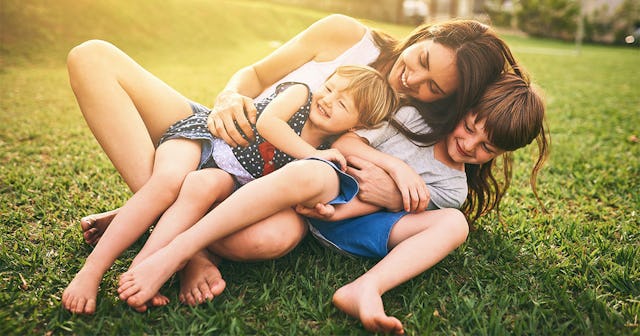Free Your Sole! You Should Go Barefoot, And Your Kids Should Too

I spent almost my entire childhood barefoot. There was little reason to wear shoes outside of being in public places. Every ground space was fair game for my feet: picking vegetables out of the garden, climbing apple trees, running across the gravel driveway, walking through our house. It felt odd and uncomfortable to wear shoes. Even to this day, I’m always barefoot inside our home, and sometimes outside—my kids, too.
Shoes serve a purpose, of course. However, they aren’t necessary all of the time. In fact, my childhood barefoot journeys had it right. Science says that being barefoot has many health benefits, and perhaps you and your fam should consider ditching the foot coverings—at least some of the time.
Start Them Young
Going barefoot can be beneficial to infants and toddlers who are learning to walk. Podiatrist Tracy Byrne tells The Guardian that when toddlers learn to walk barefoot, they are less likely to look down and fall over. “The feedback they get from the ground means there is less need to look down, which is what puts them off balance and causes them to fall down,” she explains. Additionally, Byrne says that going barefoot is important for muscle development as kids are learning to walk, it strengthens your child’s foot arch, and it helps with posture. You may notice that many popular children’s shoe companies offer soft-soled, flexible shoes, which offer kids some protection while also allowing for a taste of the benefits of bare feet.
Practice Grounding
I only recently learned about the practice of grounding—also called earthing–which is putting bare feet to the floor, particularly the outside ground. It’s been reported that doing so has significant health benefits. The Washington Post reports that “research has shown barefoot contact with the earth can produce nearly instant changes in a variety of physiological measures, helping improve sleep, reduce pain, decrease muscle tension and lower stress.” Yes, please!
Get Your Antioxidants
sot/Getty
I think of antioxidants as drinking green juices and trying to eat enough fruits and veggies every day, but it turns out that may not be in the only way to get my antioxidant on. “One reason direct physical contact with the ground might have beneficial physiological effects is the earth’s surface has a negative charge and is constantly generating electrons that could neutralize free radicals, acting as antioxidants,” one dietitian explains. If letting my feet touch the ground may boost my immunity and overall health, sign me up. Plus, getting outdoors for movement, fresh air, and some vitamin D from the sun sounds lovely.
Shoes Can Cause Injury
I thought shoes were supposed to protect our feet from injury, but it turns out, they may do more harm than good. Get this, courtesy of Medium writer Brian Deines: “when feet are trapped inside shoes, over time they become weak from lack of use to the point of atrophy. That atrophy results in lack of strength which leads to injury.” The foot contains a complex system of muscle, bone, and skin, all of which can be harmed by shoes, even those promising to be good for the feet.
Shoes can also dampen athletic performance
My runner friends are obsessed with finding the best shoes to improve their running time and overall performance. However, Brian Deines also says that “The padding and the support in shoes limit/negate natural ground-feel, biofeedback, and proprioception, which results in limited bodily awareness and under-utilized athleticism.” This is why “barely there” shoes and even exercising barefoot has been trendy in recent years. Maybe all the yogis and martial arts practitioners have it right.
Older People May Benefit Too
Just like babies benefit from learning to walk using their bare feet, older folks might as well. According to Scientific American, “Balance might also be a casualty of soft soles. People’s feet become less sensitive as they age. If they have also lost touch with the ground, they might become more vulnerable to falls.” Of course, going barefoot requires that the space is free from debris that can cut feet and clutter which can cause falls.
Of course, being barefoot all the time is impossible and can be dangerous for your health depending on the environment. Carve out barefoot time when you can. Make your home a shoe-free place, just watch out for your kid’s Lego bricks. Leave a basket by your door for guests to place their shoes, and make sure you vacuum and sweep often to remove any debris that can harm your feet. Plus, wearing your running-around-in-public shoes around your house is gross.
If you have access to a safe outdoor space, practice grounding naturally by simply walking around barefoot. If you have a young child who is learning to walk, invest in soft, thinner soled shoes for them to wear when not at home. When home, let the little one go barefoot as they learn to move.
Don’t fall for false claims from shoe companies that promise any magical properties in their footwear. Almost every source I consulted said there’s no perfect shoe, and companies use clever marketing strategies to coax you into purchasing their “superior” footwear.
With spring in full swing and summer just around the corner, consider that ditching shoes and connecting your feet with the ground can offer significant benefits. Leave your shoes by the door and enjoy the perks of going barefoot. Plus, you’ll now have a great reason to get that fabulous pedicure.
This article was originally published on